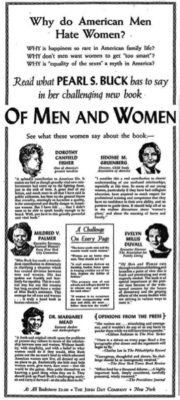Editor's Note
“The time is ripe to seriously interrogate what we mean by the words ‘revolution’ and ‘reform.’”—Chris Suh
 Summer can be prime writing season, so why not check in with a few more of our recent prize winners for inspiration? Today we’re chatting with Chris Suh of Emory University, who was awarded the S-USIH Dorothy Ross Article Prize for “‘America’s Gunpowder Women:’ Pearl S. Buck and the Struggle for American Feminism, 1937-1941.” Suh’s work was published in the Pacific Historical Review [Vol. 88, No. 2 (Spring 2019), 175-207].
Summer can be prime writing season, so why not check in with a few more of our recent prize winners for inspiration? Today we’re chatting with Chris Suh of Emory University, who was awarded the S-USIH Dorothy Ross Article Prize for “‘America’s Gunpowder Women:’ Pearl S. Buck and the Struggle for American Feminism, 1937-1941.” Suh’s work was published in the Pacific Historical Review [Vol. 88, No. 2 (Spring 2019), 175-207].
What are you working on now?
I am currently working on my first book manuscript, tentatively titled At the Dawn of the Pacific Era: American Empire and Exclusion in the Age of Reform. It traces the rise of the United States as a Pacific power during the Progressive Era, and explores how American preoccupations with “reform” were responsible for the particular shape that US foreign and immigration policies took towards people of Asian ancestry. In addition to examining the ideas and decision-making process of American diplomats, politicians, academics, and missionaries, I follow the lives of American-educated Korean and Japanese elites who decided to cooperate with Americans in the making of a US-led Pacific order, in pursuit of the perceived promise of racial inclusion, in the four decades leading up to Pearl Harbor.

Of Men and Women advertisement, The New York Times, 24 Aug. 1941, Sunday edition, 86.
Within our field of intellectual history, what topics or approaches are you excited about?
Although my primary training is in Asian American history and US-East Asia relations, I am always drawn to works of intellectual history that focus on individuals whose ideas have been dismissed as unworthy of serious study. I have been encouraged and invigorated by reading some fantastic books on American missionaries, especially David Hollinger’s Protestants Abroad (2017), as well as path breaking works on black women, especially Brittney C. Cooper’s Beyond Respectability (2017). In addition, I’m looking forward to reading Judy Wu’s forthcoming biography of Patsy Mink, the first Asian American woman to be elected to Congress and a co-author of Title IX. These works are exemplary of how an intellectual history approach to the history of race and politics can enrich our understanding of the past as well as the present.
This year, our annual meeting theme is “Revolution and Reform.” Can you reflect on how those ideas connect to your scholarship?
Because I am currently writing about the Progressive Era, I am naturally drawn to the theme of “Revolution and Reform.” In light of what’s been happening in the United States, as well as the world outside of it, I also think the time is ripe to seriously interrogate what we mean by the words “revolution” and “reform.” I certainly look forward to getting my own ideas about these terms challenged through exciting discussions at the annual meeting.

0